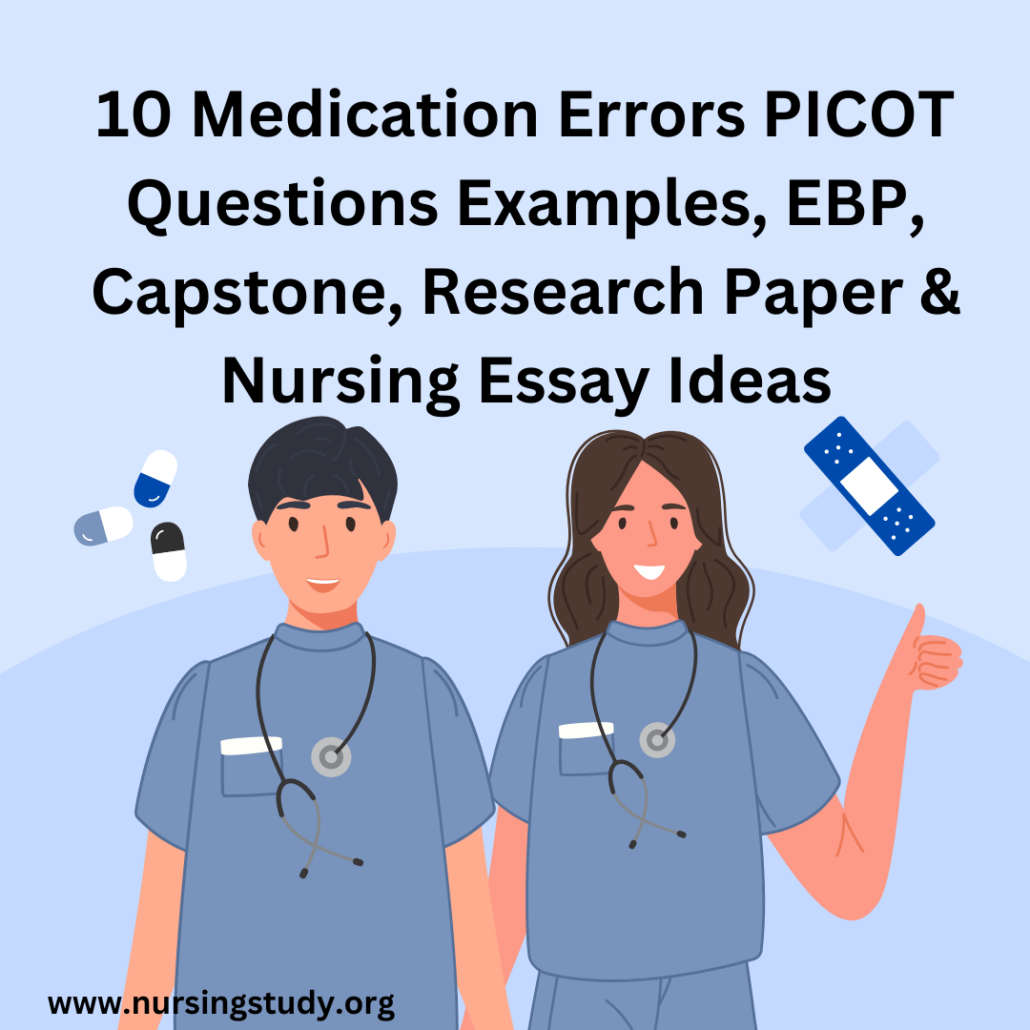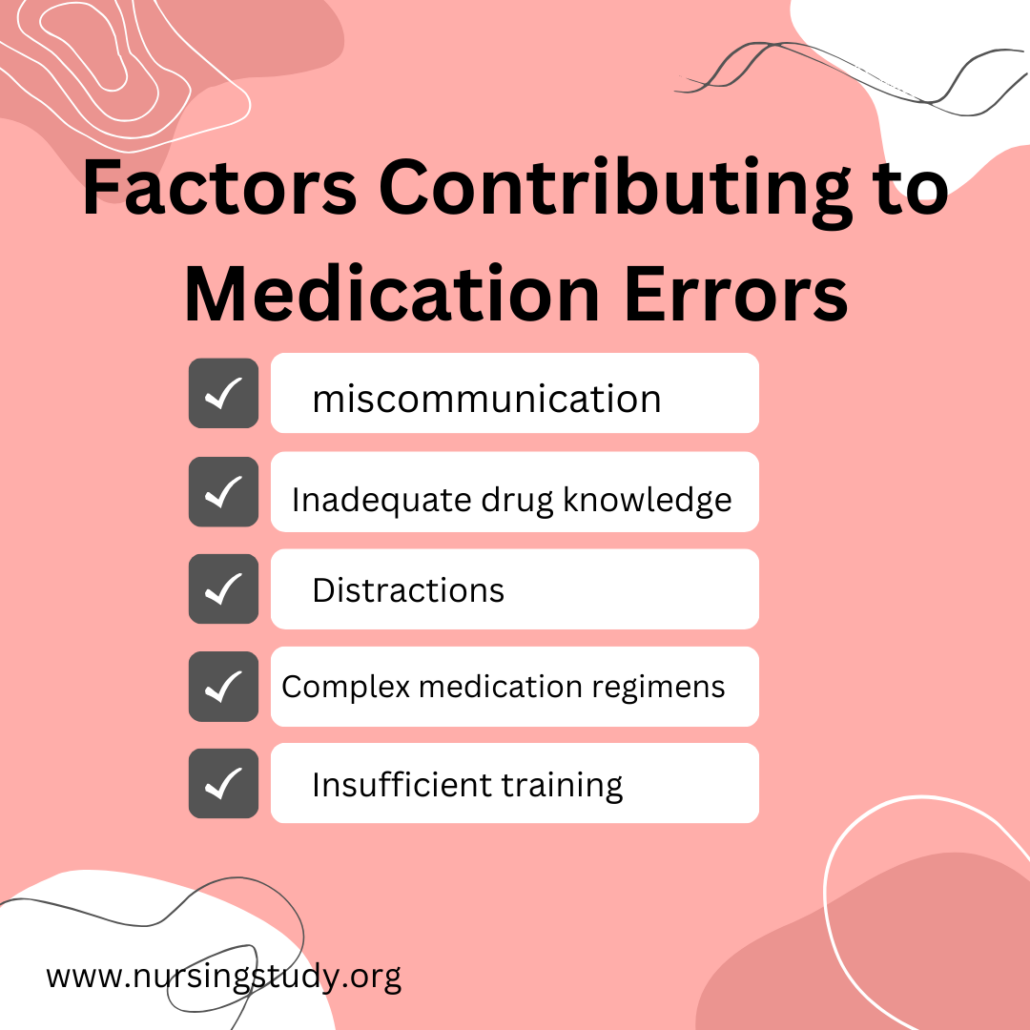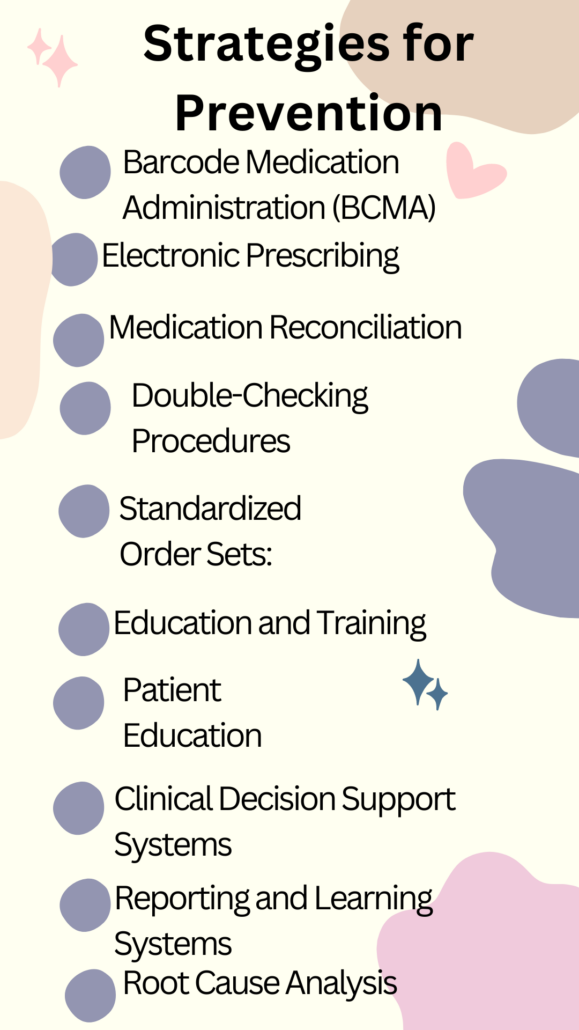
Medication errors are a significant concern in healthcare settings, posing potential risks to patient safety and well-being.
The PICOT question examples for medication errors below should help you craft your nursing PICOT Paper.
Nursing Paper Topics and Ideas on Medication Errors
Further, we also give you Nursing Paper Topics and Ideas on Medication Errors, including 10 EBP project ideas on medication errors, nursing capstone projects on medication errors, research paper topics on medication errors, and medication errors essay topic ideas.
10 PICOT question examples for medication errors
- In elderly patients (P), how does a pharmacist-led medication review (I) compared to standard care (C) affect the rate of medication errors (O) within six months (T)?
- In pediatric hospital units (P), what is the effect of using barcode medication administration (I) on the occurrence of medication errors (O) compared with manual medication administration (C) within one year (T)?
- In patients with chronic conditions (P), how does the implementation of electronic prescribing and medication reconciliation (I) compare to standard paper-based processes (C) influence the accuracy of medication regimens (O) over six months (T)?
- In intensive care units (P), what is the impact of nurse education and training on medication administration safety (I) compared to no additional training (C) on the occurrence of medication errors (O) over three months (T)?
- In hospitalized surgical patients (P), how does the use of standardized order sets for perioperative medications (I) compared to individually tailored orders (C) affect the frequency of medication errors (O) within the first 48 hours post-surgery (T)?
- In psychiatric care settings (P), what is the effect of implementing a clinical decision support system for psychotropic medications (I) on the rate of medication errors (O) compared to standard medication management practices (C) over one year (T)?
- In outpatient clinics (P), how does involving patients in medication reconciliation and self-administration education (I) compared to healthcare provider-led medication management (C) influence the occurrence of medication errors (O) over six months (T)?
- In long-term care facilities (P), what is the impact of interdisciplinary team collaboration on medication safety (I) compared to traditional hierarchical care structures (C) on the occurrence of medication errors (O) within Six Weeks period (T)?
- In emergency departments (P), how does the use of real-time medication monitoring and alerts (I) compared to manual medication chart review (C) affect the occurrence of medication errors (O) within 24 hours of patient admission (T)?
- In-home healthcare settings (P), what is the effect of involving family caregivers in medication management (I) compared to relying solely on professional caregivers (C) on the rate of medication errors (O) over three months (T)?
What is Picot for medication error? – In hospitalized surgical patients (P), how does the use of standardized order sets for perioperative medications (I) compared to individually tailored orders (C) affect the frequency of medication errors (O) within the first 48 hours post-surgery (T)?
You can also read about Examples Of PICOT Questions & Papers
20 EBP Projects Ideas Related to Medication Errors
- Impact of Medication Safety Workshops: Assess the effectiveness of hosting workshops focused on medication safety for healthcare providers in reducing medication errors.
- Nurse-Led Medication Reconciliation: Evaluate the outcomes of nurse-led medication reconciliation during care transitions on medication error rates.
- Automated Medication Dispensing Systems: Investigate how implementing automated medication dispensing systems reduces errors in hospital wards.
- Comparative Medication Error Analysis: Compare medication error rates in a hospital before and after implementing an electronic prescribing system.
- Patient-Initiated Medication Review: Explore the benefits of empowering patients to initiate medication reviews with healthcare providers to identify and address potential errors.
- Medication Safety Rounds: Evaluate the effectiveness of conducting routine medication safety rounds in identifying and preventing errors in nursing units.
- Medication Error Reporting Culture: Investigate the correlation between the reporting culture of medication errors and the overall rate of errors within a healthcare institution.
- Healthcare Provider Communication Training: Examine the impact of communication training for healthcare providers on reducing errors related to unclear medication orders.
- Impact of Barcode Scanning: Measure the effect of barcode medication scanning on medication error rates in a rehabilitation facility.
- Medication Error Feedback System: Develop and assess the outcomes of a feedback system that provides healthcare providers with real-time information about their medication error rates.
- Medication Labeling Design: Investigate the influence of medication label design on the accuracy of medication administration in outpatient settings.
- Medication Administration Time: Evaluate the relationship between medication administration timing and the occurrence of errors in long-term care facilities.
- Clinical Decision Support Implementation: Examine the effects of implementing clinical decision support systems on medication error rates in critical care units.
- Nurse-Pharmacist Collaboration: Investigate the impact of collaborative efforts between nurses and pharmacists on preventing medication errors in the hospital setting.
- Patient Medication Education Effectiveness: Assess the effectiveness of different patient education methods on reducing self-administration errors in outpatient settings.
- Medication Error Root Cause Analysis: Conduct a comprehensive root cause analysis of a recent medication error to identify underlying system issues.
- Impact of Medication Alerts: Study the influence of real-time medication alerts in electronic health records on the frequency of medication errors in primary care clinics.
- Medication Error Prevention Tools: Develop and evaluate the outcomes of a mobile application designed to help patients manage and track their medications to prevent errors.
- Elderly Medication Regimen Simplification: Investigate the impact of simplifying medication regimens for elderly patients on reducing errors in residential care facilities.
- Medication Safety Audits: Conduct regular audits of medication administration processes in healthcare units to identify potential vulnerabilities and errors.
20 Nursing Capstone Project Ideas for Medication Errors
- Improving Medication Administration Workflow: To reduce errors, develop and implement a streamlined medication administration process in a specific hospital unit.
- Medication Error Case Study Analysis: Analyze a real-life medication error case and propose recommendations for prevention based on root cause analysis.
- Simulation-Based Medication Safety Training: Design and deliver simulation-based training sessions for nursing students to enhance their medication administration skills and awareness of potential errors.
- Medication Safety Campaign: Create a campaign to raise awareness about medication safety among patients, families, and healthcare providers.
- Medication Error Reporting System Enhancement: Develop a user-friendly digital platform for reporting and analyzing medication errors within a healthcare organization.
- Medication Labeling Redesign: Redesign medication labels for a specific medication class to improve clarity and reduce the risk of administration errors.
- Medication Error Prevention Toolkit: Create a comprehensive toolkit for healthcare providers to promote medication safety practices and prevent errors.
- Pediatric Medication Safety Assessment: Conduct a thorough assessment of pediatric medication safety practices in a hospital and propose evidence-based improvements.
- Evaluating Nurse-Pharmacist Collaboration: Evaluate the impact of interprofessional collaboration between nurses and pharmacists on medication error rates in a specific clinical setting.
- Medication Safety Protocol Development: Develop evidence-based protocols for managing high-alert medications in critical care units to prevent errors.
- Medication Safety Dashboard: Design a dashboard that displays real-time medication error data for healthcare administrators to monitor and take timely actions.
- Patient-Centered Medication Education Program: Develop and implement a patient-centered medication education program to empower patients in managing their medications and reducing errors.
- Medication Safety Technology Assessment: Evaluate the effectiveness of various medication safety technologies in preventing errors, such as barcode scanning and automated dispensing systems.
- Medication Safety Gap Analysis: Conduct a gap analysis of medication safety practices in a healthcare institution and recommend improvements based on best practices.
- Medication Reconciliation Process Improvement: Identify areas for improvement in the medication reconciliation process during transitions of care and propose enhancements.
- Healthcare Provider Communication Training: Design and implement a training program to improve communication among healthcare providers during medication-related interactions.
- Elderly Medication Management Support: Develop a smartphone application tailored for elderly patients to assist them in managing their medications safely.
- Medication Error Quality Improvement Project: Implement a quality improvement project to reduce medication errors within a specific department or unit.
- Medication Safety Audit and Feedback: Conduct regular audits of medication administration practices and provide constructive feedback to nursing staff for continuous improvement.
- Long-Term Care Medication Safety Assessment: Assess medication safety practices in long-term care facilities and propose interventions to reduce errors in this unique setting.
You can also read more about Capstone Project Ideas for Nursing Leadership
20 Medication Errors Nursing Research Paper Topics
- Role of Nursing Leadership in Medication Safety Improvement Initiatives.
- Effects of Healthcare Culture on Medication Error Reporting and Learning.
- Impact of Medication Reconciliation on Reducing Adverse Drug Events.
- Interprofessional Collaboration and Its Influence on Medication Safety.
- Ethical Considerations in Medication Error Reporting and Disclosure.
- Medication Error Rates in Different Nursing Specialties: A Comparative Analysis.
- Technology-Enhanced Approaches to Medication Safety in Pediatric Care.
- Psychosocial Factors Affecting Medication Adherence and Safety.
- Medication Errors in Home Healthcare: Challenges and Solutions.
- Medication Error Prevention Strategies in Emergency Department Settings.
- The Impact of Nursing Workload on Medication Administration Errors.
- Patient Perspectives on Medication Safety and Self-Management.
- Medication Safety in the Context of Medication Dispensing Robots.
- Medication Safety in Geriatric Population: Challenges and Interventions.
- Impact of Clinical Decision Support Systems on Medication Error Rates.
- Cultural Competence in Medication Management: Implications for Patient Safety.
- Medication Error Reporting: Barriers, Facilitators, and Solutions.
- Medication Safety Education and Training for Nursing Students.
- Human Factors Engineering in Designing Medication Administration Processes.
- Medication Errors in Pediatric Oncology: Understanding Unique Risks and Prevention Strategies.
Other students also read about Musculoskeletal Research Topics
20 Medication Errors Nursing Research Questions
- What are the primary contributing factors to medication errors in critical care settings, and how can they be addressed?
- How does implementing an electronic medication reconciliation system impact medication error rates during patient care transitions?
- What is the relationship between nurse workload and the occurrence of medication administration errors in busy hospital units?
- How do cultural factors influence medication adherence and patient safety in diverse populations?
- What are the barriers and facilitators to healthcare providers’ engagement in reporting medication errors, and how can reporting cultures be improved?
- How effective are clinical decision support systems in reducing medication errors and improving patient outcomes?
- What are the unique medication safety challenges pediatric patients face, and what interventions are most effective in preventing errors?
- How does interprofessional collaboration between nurses and pharmacists influence medication safety in acute care settings?
- What ethical considerations should guide the disclosure of medication errors to patients and their families?
- How can patient education and empowerment reduce medication administration errors in home healthcare settings?
- What role does medication labeling design play in preventing medication errors, and how can labels be optimized for clarity and understanding?
- How do different healthcare cultures and organizational structures impact medication error reporting and learning?
- What are the implications of medication errors in geriatric populations, and how can interventions be tailored to address their unique needs?
- How can technology-enhanced approaches, such as mobile applications and wearable devices, contribute to improving medication safety for patients?
- What interventions can be implemented to ensure medication safety during pediatric oncology treatments, considering the complex and high-risk nature of these therapies?
- How can human factors engineering principles be applied to optimize medication administration processes and reduce errors?
- What strategies can be employed to improve medication reconciliation practices in long-term care facilities and reduce discrepancies?
- How does medication error reporting and learning differ across various healthcare settings, and how can best practices be shared and implemented?
- What impact does patient-centered communication training have on reducing medication errors during patient-provider interactions?
- What are the potential impacts of AI-driven clinical decision support systems on medication safety, and what ethical concerns should be addressed in their implementation?
20 Medication Errors Nursing Essay Topic Ideas
- Exploring the Role of Nurses in Medication Error Prevention: Challenges and Solutions.
- Ethical Dilemmas in Medication Error Reporting and Disclosure: Balancing Accountability and Patient Safety.
- The Impact of Medication Errors on Patient Outcomes: A Comprehensive Review.
- Improving Medication Safety Culture: Strategies for Fostering a Learning Environment.
- The Intersection of Technology and Medication Safety: Benefits, Challenges, and Future Directions.
- Medication Errors in Pediatric Patients: Understanding Developmental Considerations and Preventive Strategies.
- Empowering Patients in Medication Management: The Role of Education and Communication.
- Human Factors Engineering in Healthcare: Designing Systems to Prevent Medication Errors.
- Cultural Competence in Medication Management: Navigating Patient Diversity for Enhanced Safety.
- Exploring the Psychological Impact of Medication Errors on Healthcare Providers: Coping Strategies and Support Systems.
- The Economics of Medication Errors: Estimating the Financial Burden and Cost-Effectiveness of Prevention Measures.
- Medication Safety in the Age of Telehealth: Challenges and Innovations.
- Nursing Leadership and Medication Safety Improvement: Strategies for Cultivating a Culture of Safety.
- Medication Reconciliation in the Transition from Hospital to Home: Ensuring Continuity of Care.
- Medication Errors in Elderly Patients: A Multifaceted Approach to Prevention and Management.
- Medication Safety in a Digital Era: Exploring the Role of Electronic Health Records and Mobile Applications.
- Psychosocial Factors Affecting Medication Adherence: Addressing Barriers to Enhance Patient Outcomes.
- Interdisciplinary Collaboration in Medication Safety: Leveraging Diverse Expertise for Error Prevention.
- Medication Errors in Pediatric Oncology: Addressing Challenges in High-Risk Treatments.
- Medication Error Root Cause Analysis: Unveiling Systemic Flaws for Lasting Improvement.
6 Medication Errors Nursing Paper Examples
- Preventing Medication Errors Among Nurses
- Electronic Medication Administration With Barcoding
- Consequences Of Abruptly Stopping The Medication Once A Person Has Been Taking It
- Medication Guide
- Fundamentals of neurotransmission as it relates to prescribing psychotropic medications for clients with acute and chronic mental health conditions
- Multifactorial Medication Mishap Case Study
Factors Contributing to Medication Errors

Medication errors can result from a combination of factors related to healthcare providers, patients, systems, and processes. Contributing factors include miscommunication, inadequate drug knowledge, distractions, complex medication regimens, and insufficient training.
These errors can occur at various stages, including prescribing, transcribing, dispensing, and administering medications.
Strategies for Prevention
Preventing medication errors requires a multi-faceted approach involving healthcare professionals, patients, and healthcare systems. Some strategies include:

- Barcode Medication Administration (BCMA): Implementing BCMA systems can reduce errors by ensuring that the right patient receives the right medication in the right dose at the right time.
- Electronic Prescribing: Transitioning to electronic prescriptions can minimize errors related to illegible handwriting and improve communication among healthcare providers.
- Medication Reconciliation: Conducting thorough medication reconciliation during care transitions can help identify discrepancies and prevent errors stemming from incomplete medication histories.
- Double-Checking Procedures: Implementing double-checking protocols for high-risk medications can provide an additional layer of safety.
- Standardized Order Sets: Developing standardized order sets can streamline the prescribing process and reduce the risk of dosage errors.
- Education and Training: Regular education and training on medication safety for healthcare providers, including proper drug administration techniques and error reporting, are crucial.
- Patient Education: Empowering patients to actively participate in their medication management by providing clear instructions and information can help prevent errors.
- Clinical Decision Support Systems: Integrating clinical decision support tools into electronic health records can provide alerts and guidance to healthcare providers during medication-related decisions.
- Reporting and Learning Systems: Establishing an environment that encourages reporting of errors without fear of punishment fosters a culture of continuous improvement and learning.
- Root Cause Analysis: Conducting thorough root cause analyses for reported errors can uncover underlying systemic issues contributing to medication errors.
FAQs
1. What are six types of medication errors?
Incorrect diagnosis, prescribing errors, dose miscalculations, poor drug distribution practices, drug and drug device related problems, incorrect drug administration, failed communication and lack of patient education.
2. What should a nurse do when a medication error occurs?
Take immediate corrective measures. Inform the patient’s doctor of the mistake so that action can be taken as soon as possible to counteract the effects of the incorrect medication.
3. What are the 5 rules to prevent medication errors?
The right patient, the right drug, the right time, the right dose, and the right route.
4. What is an example of a medication error?
An example is choosing the incorrect diluent to reconstitute.
Sources
- “Medication Errors: Causes, Prevention, and Risk Management” by Michael R. Cohen.
- “Medication Errors: The Nursing Experience” by Marjorie V. Beyers.
- “Medication Safety in Practice” by Patricia Stone, EdD, RN, and Cynthia Foronda, PhD, RN.
- “Patient Safety and Healthcare Improvement at a Glance” by Sukhmeet S. Panesar, Andrew Carson-Stevens, and Sarah K. Noble.
- “Nursing Research: Generating and Assessing Evidence for Nursing Practice” by Denise F. Polit and Cheryl Tatano Beck.
A Page will cost you $12, however, this varies with your deadline.
We have a team of expert nursing writers ready to help with your nursing assignments. They will save you time, and improve your grades.
Whatever your goals are, expect plagiarism-free works, on-time delivery, and 24/7 support from us.
Here is your 15% off to get started.
Simply:
- Place your order (Place Order)
- Click on Enter Promo Code after adding your instructions
- Insert your code – Get20
All the Best,
Cathy, CS


